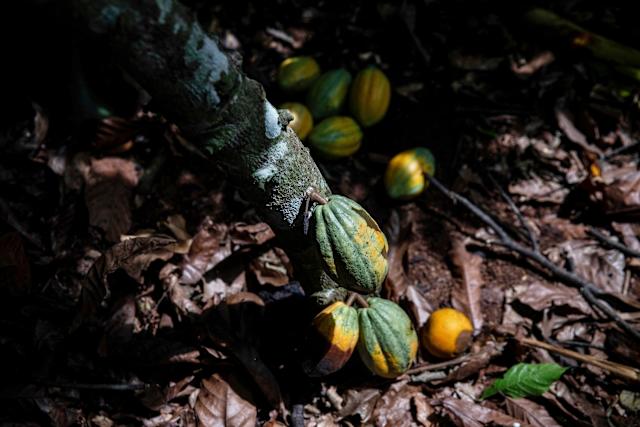
For decades, ginger remains the dominant source of income for locals in Southern Kaduna. Meanwhile, a strange infestation has ruined it all, killing the farmers and the crops. For two weeks, Mohammed Taoheed traveled to five local government areas inside the conflict-torn region to document the sad tales of the farmers.
On a sunny morning last August, Jatau Malichy, 65, left his home in Mafo-fadia, a village in Kachia Local Government Area in the southern part of Kaduna State, North-west Nigeria, to inspect his farm. After retiring as a librarian with the state government, Mr Malichy had devoted himself to cultivating ginger on the five-hectare farm. But what he noticed of the crops that day left him bewildered and heartbroken. The crops were wilting.
Over a few weeks from July, a ‘strange disease’ gradually devastated the crops. Mr Malichy’s 58-year old widow, Bathsheba, believes the shock over the loss of his crops led to his death a few days later on 7 August.
The community had practised ginger farming for as long as Mrs Malichy could remember. She and her husband used proceeds from their farm to build their house in the village in 2019. “Our plan was that after that 2023 harvest, we would not farm again. So we doubled what we normally planted, hoping for more proceeds,” she told the reporter at the village in February. The family employed 50 people from neighbouring villages to work on the farm during the planting season.
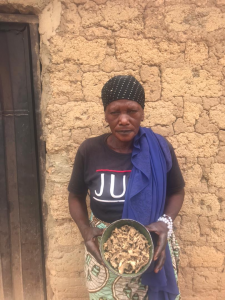
“But we harvested nothing. The worst part is that I lost my husband to the epidemic. He was a hardworking man and the breadwinner of this family. He left me unexpectedly to cater for our four children alone.”
Mrs Malichy said three of the children are still in school.
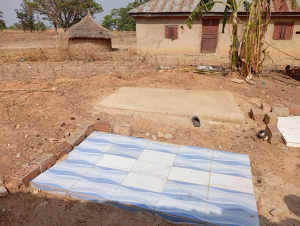
The family’s experience with their farm was shared by hundreds of farmers across the area. In 2023, an outbreak of a disease called fungi pathogens infection led to the loss of ginger crops valued at billions of naira in southern Kaduna. The disease affected about 2,500 hectares of farms in seven local government areas of the state.
A professor at the Institute of Agricultural Research (IAR) at the Ahmadu Bello University (ABU), Zaria, Sarafi Afiniki , said a team sent by the institute to the area after the outbreak confirmed “a devastating problem of crop production.”
Mrs Afiniki said from the samples of the affected crops collected, “the level of infection in terms of disease incidence shows that almost all the fields were diseased while others were totally destroyed.”
A Sinking Business
Nigeria is one of the top producers of ginger globally, competing with India and China with its high-quality output sought after for its pungent aroma, high oil content and oleoresin. In 2021, Nigeria exported 523,000 metric tonnes of ginger worth $12 million, about 14 per cent of global supply that year. Nigeria exports most of its produce to Europe.
In Kaduna, ginger is a major source of income for farmers and traders. It is grown mainly in the southern part of the state. But, since the outbreak of the epidemic, local producers said production has declined.
A farming season to forget
Raymond Sule has been a ginger farmer for five decades. “I inherited it from my parents, just like others in many parts of Southern Kaduna,” he said.
“In 2023, I was expecting at least N1.3 million from my harvest because I did four hectares and hoped to harvest between 45 and 50 bags. That was more than what I used to do.
“Instead, as we dug out the crop during harvest, we saw tiny sizes. The crops had been destroyed by the infestation.”
Mr Sule said he could not take his mind away from the loss. “It is affecting my mental health, I must confess.”
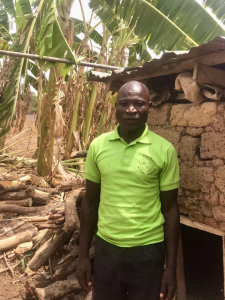
In the Kachia Local Government Area, this reporter counted 10 warehouses built by Chinese businessmen and wealthy traders for ginger. But at least two of the warehouses now store charcoal. When the reporter moved across communities in the area, smoke billowing from tree burning sites in the forest tells a story: charcoal has overtaken ginger as the biggest product of the area!
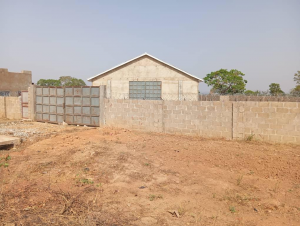
Residents told PREMIUM TIMES that illegal felling of trees became a major economic activity after the fall of the “booming business (of ginger) in the region”.
During investigations for this report in February, PREMIUM TIMES observed that the increasing felling of trees for charcoal production could erode the area’s biodiversity and aggravate the global climate crisis.
Living on the brink of debts
Leo Bakut, the head of Kamanahuang Farmers Club in Kachia, said members of the association took a loan of N800,000 from a company, Afex Fair Trade Limited, while preparing for the 2023 ginger planting season. But the farmers could not repay the loans because of poor harvests.
“Apart from the loan, I invested my pensions in it too,” said the 59-year old retired Nigerian Army soldier. “I have N506,320 balance to repay and they have called me countless times.”
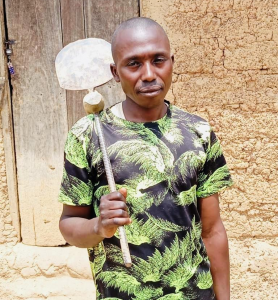
Another farmer, Neyu Thomas, said he obtained a loan of N700,000 from his church.
“The money they gave me was public money. I was only considered for it because of my position in the church and now I’ve betrayed their trust,” Mr Thomas lamented.
Morin Kahuwai, a person living with physical disability, said she did not get “even a bucket of ginger” during her harvest. She narrated how she was motivated to take up ginger farming by her sister, who is one of the leading female farmers in the area. She said her sister had assets and sponsored her children for postgraduate programmes with proceeds from ginger farming. But the epidemic turned this season into a nightmare for all the farmers, she said.
“It’s a serious issue because, as a single parent, I rely on my farm to feed my two children.”
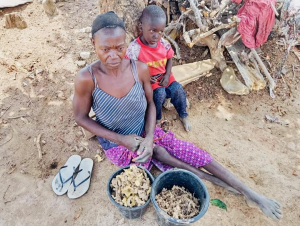
‘No ginger, no food’
Jaba LGA has a reputation for producing a highly pepperish and tasty variety of ginger. Victoria James has a farm in the area. She had just returned from the bush to hew firewood when the reporter met her in the village of Kurmin Jatau.
“People here use firewood because we cannot afford cooking gas. The ginger we all rely on is gone.”
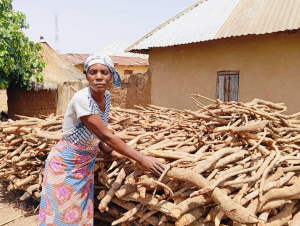
Dogo Ayuba also said the epidemic destroyed his crops in August. “I took out a loan to buy fertiliser and chemicals but I have been unable to pay back.”
“The government is not supporting smallholder farmers. They know that ginger is our major livelihood in Kaduna but they have ignored our plight.”
Hard work, zero yield
Pius Kwasau, 59, said farmers like him working a few acres in Katargo LGA found living hard after the epidemic. He said he spent his savings on fertiliser and other inputs but did not get anything out of the farm.
Across the other local government areas that PREMIUM TIMES visited, farmers told the same stories and urged the government to at least provide them seeds and other agricultural inputs to help them participate in the next planting season.
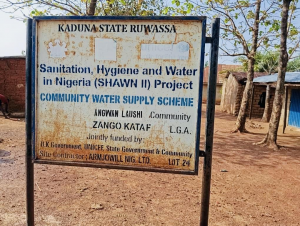
Experts Weigh In
Fidelis Dutse, a lecturer at the Department of Agricultural Extension and Rural Development at ABU Zaria, said inadequate education on farming methods and disease management was responsible for the ginger infestation.
“The level of awareness on agricultural practices for farmers in Southern Kaduna is weak because there are few extension agents around and some local governments do not have one at all. This gap leads to indiscriminate use of chemicals, fertilisers and other inputs because the farmers believe the more they apply, the more extinction of weeds and growth of what they planted. Alas, the effect of this practice might lead to several challenges like this,” Mr Dutse said while speaking with PREMIUM TIMES in Zaria.
To prevent future problems, he said the government needs to be “proactive in empowering farming communities with beneficial and sustainable training to create uniform regulation on the scientific recommended dosage and method of application of agro-chemicals on ginger.”
He also urged the state government to assist the farmers with a pre-emergency fund, “which is usually set aside for natural occurrences like this, to help mitigate the impact of the crisis.”
Corroborating Mr Dutse’s observation, Mrs Afiniki, the professor at the IAR, ABU Zaria, said there is poor communication between the government and famers on agricultural practices in the state.
“There are some measures like crop rotation, use of seeds from a healthy field, raise-bed and others which might help to prevent the widespread of the disease but they didn’t know. If they had known, they would be more meticulous in their agricultural practices,” she said.
On the solution to this particular disease, she said: “The organisms that affect crops like ginger are many so one needs to find the root cause of what is responsible for the outbreak before you can know the treatment to recommend as the symptoms differ, from what you see on the field, and you need to really identify the organism that caused this
“The team at IAR has the farming mandate system for Northwest states, including Kaduna, so we went to the field immediately after the outbreak and we observed that it is a devastating problem of crop production. Samples of the affected crops were collected and the level of infection in terms of disease incidence shows that almost all the fields were diseased while others were totally destroyed.
“Based on this, we did some laboratory work and isolated some organisms. But we have to do a pathogenesis test, which we are yet to do because it requires some inputs, and it is after this that we know the right things to do to prevent future outbreak.”
Traditional Rulers Urge Authorities to Act
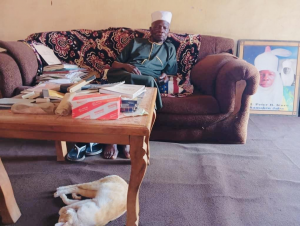
Speaking with this newspaper, Peter Kure, the district head of Jaba, said the community was in stagnation due to the ginger epidemic that has brought developmental setbacks to them.
“We now suffer from hunger. Our people will be happy to get seeds to try planting again but the government is not forthcoming with any assistance so far, even though Jaba produces the best ginger here.”
The octogenarian said the epidemic has pushed up the local price of ginger to around N100,000 from N40,000.
Peter Digah, the village head of Kenyin in Katargo LGA, said the government sent officials to register farmers in the area but had made no further communication since last year.
“While we believe they might have plans, not executing the plans before the next planting season will be disastrous as we don’t have any seeds to plant again. Our lives are tied to ginger, they should act now.”
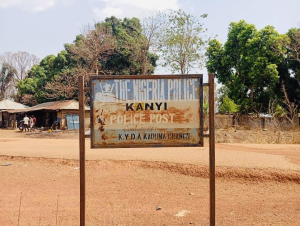
Kaduna Government Speaks Over Situation
However, the Kaduna State government said it has a plan for the farmers, a claim corroborated by a key actor in the sector.
The Managing Director of AFEX Nigeria, Kamaldeen Raji, the company that gave loans to farmers in Kachia as reported earlier, told PREMIUM TIMES that many farmers took part in the company’ 2022 wet season input financing programme.
“Their repayment was due prior to the breakout of the epidemic around July 2023, which we are aware had a significant effect for the 2023 programme participants.”
Mr Kamaldeen said the company was treating the farmers’ debts as a civil matter and was collaborating with the state government to help the farmers.
“Our work in the regard of climate and natural disasters is evolving as a key part of our response today is the inclusion of yield insurance products within the framework of the input financing programme for farmers to take advantage of.
“In some cases of default, we can work out a refinancing agreement with farmers and have done so in extenuating circumstances, where we are able to verify all information and arrive at a plan that balances stakeholder requirements.
“We joined the taskforce set up by the Kaduna government as part of our remediation strategy and we are coming up with practical solutions to combat the 2023 experience.”
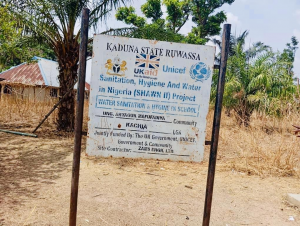
When contacted, Murtala Dabo, the state’s Commissioner of Agriculture, told PREMIUM TIMES that the state government distributed fungicides to smallholder farmers affected by the disease outbreak. He said the government has other plans too to remedy the situation.
“Immediately the disease was discovered, the Ministry invited a team of scientists from the Institute of Agricultural Research (IAR), Ahmadu Bello University, Zaria. The result from their investigation indicated that the causes of the disease are fungal pathogens and the government has engaged more scientists and research institutes to narrow down the search to a particular family of pathogens.”
The commissioner said that the effort of the state also led to the intervention from the Federal Government through the Ginger Blight Epidemic TaskForce in the office of the Vice President. Some weeks ago, the National Agricultural Development Fund (NADF) launched a N1.6 billion Recovery Package in Kaduna,” he added.
Furthermore, Mr Dabo said the government through extension officers was educating the affected farmers to adopt crop rotation to heal and protect the soil while a plan was ongoing to establish a Quality Control and Disease Surveillance unit at the Ministry to work on “early warning of disease outbreak and ensuring that crop quality is maintained and improved.”
For many of the farmers who just need improved seed and chemicals, support from the government can not come too early as they are already in the new planting season.
This story is completed with the support of the Centre for Journalism Innovation and Development.
About The Author
Related Articles
Ivory Coast to Buy Unsold Cocoa to Support Farmers
Ivory Coast has announced a government plan to purchase unsold cocoa stock...
ByWest Africa WeeklyJanuary 23, 2026Ghana Moves to Reclaim Kwame Nkrumah’s Former Residence in Guinea
Ghana has embarked on a diplomatic and cultural initiative to reclaim the...
ByWest Africa WeeklyJanuary 23, 2026Senegal Honors Players and Coach After AFCON Triumph
Senegal has formally honored its Africa Cup of Nations winning team, awarding...
ByWest Africa WeeklyJanuary 23, 2026Burkina Faso, Mali, and Niger Turn to Russia for Shared Telecom Network
Burkina Faso, Mali, and Niger have announced plans to develop the Sahel’s...
ByWest Africa WeeklyJanuary 23, 2026









